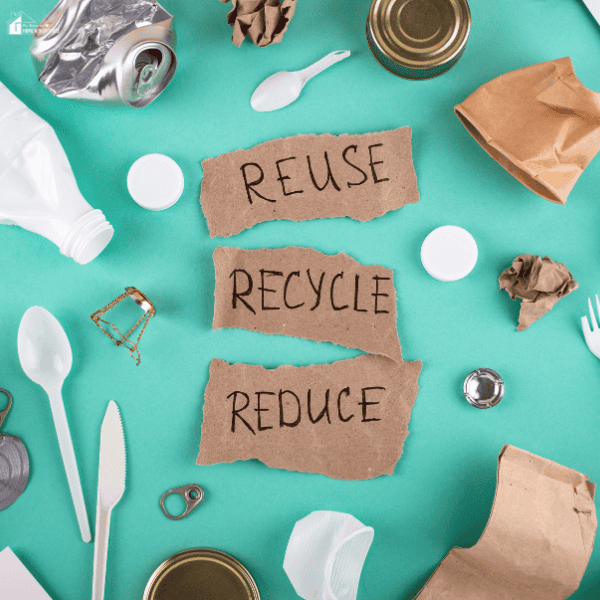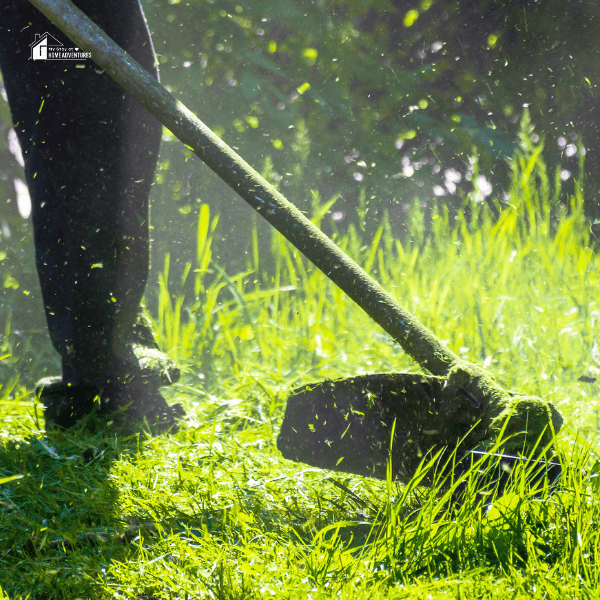5 Easy Ways My Family Goes Green And Saves Money
This post may contain affiliate links which might earn us money. Please read my Disclosure and Privacy policies hereIn today's world, being environmentally conscious while also saving money is a win-win situation for both your wallet and the planet. As a family, finding simple yet effective ways to go green can not only reduce your carbon footprint but also contribute to a more sustainable lifestyle. Here are five easy ways my family goes green and saves money.

Why Going Green Matters
We all know that our planet faces significant challenges, from climate change to pollution. But sometimes, making eco-friendly choices can seem daunting or expensive. That's where these simple, cost-effective strategies come in. Not only do they help the environment, but they also help us save money—a win-win situation!
Check out these posts:
- 4 Thrifty Costume Ideas For Halloween
- How To Eliminate Clutter From Your Home
- 10 Essential Oil Combinations to Diffuse
Tip 1: Adopting a Minimalist Lifestyle
One of the first steps my family took towards a greener lifestyle was adopting minimalism. Minimalism is all about living with less, focusing on what truly matters, and reducing consumption and waste.
Benefits of Minimalism
First, minimalism helps cut down on unnecessary purchases. By only buying what we truly need, we've saved a lot of money. Additionally, fewer possessions mean less clutter, which makes our homes easier to manage and maintain.
How to Start
If you’re new to minimalism, start by decluttering one room at a time. Ask yourself if each item brings value to your life. If not, consider donating, recycling, or selling it. This not only helps you reduce waste but also gives items that others might need a second life.
Practical Advice
Another tip is to adopt a ‘one in, one out' policy. For every new item you bring into your home, commit to removing one. This keeps your possessions in check and ensures you're mindful about new purchases.
Tip 2: Embracing Sustainable Energy and Water Use
Energy and water are essential resources, but their misuse can lead to wastage and high bills. By making conscious choices, you can significantly reduce your consumption and save money.
Importance of Renewable Energy
Switching to renewable energy sources like solar or wind power is a great way to reduce your carbon footprint. Although there may be an initial investment, the long-term savings and environmental benefits are substantial. Plus, many governments offer incentives and rebates for adopting renewable energy.
Reducing Water Consumption
Water is another precious resource that we often take for granted. Simple changes like fixing leaks, installing low-flow showerheads, and using water-efficient appliances can make a big difference.
Implementation Tips
In our home, we use programmable thermostats to regulate heating and cooling, which helps us save on energy bills. We also collect rainwater for gardening, which reduces our water usage and supports our plants.
Tip 3: Making Smart Shopping Choices
Making informed shopping choices can have a significant impact on both your finances and the environment. By prioritizing eco-friendly and sustainable products, you support ethical practices and reduce your carbon footprint.
Reading Labels
When shopping, pay attention to product labels. Look for certifications like Fair Trade, USDA Organic, or Energy Star, which indicate that the product meets certain environmental or ethical standards.
Prioritizing Quality Over Quantity
Investing in high-quality items that last longer may cost more upfront but save you money in the long run. This applies to everything from clothing to household goods.
Supporting Local Businesses
Buying locally produced items reduces transportation emissions and supports your community. Farmers' markets are great places to find fresh, locally grown produce.

Tip 4: Reducing, Reusing, and Recycling
The 3R's of sustainability—Reduce, Reuse, and Recycle—are fundamental principles that help minimize waste and conserve resources.
Reducing Waste
The first step is to reduce the amount of waste you produce. This can be done by avoiding single-use plastics, opting for reusable bags, and buying in bulk to reduce packaging.
Reusing Items
Before throwing something away, think about how it can be reused. Glass jars, for example, can be repurposed for storage. Old clothes can be turned into rags or craft projects.
Recycling Properly
Make sure to recycle correctly by following your local recycling guidelines. Not all materials are recyclable, and improper recycling can contaminate the entire batch, making it unusable.
Tip 5: Growing Your Own Food and Composting
One of the most rewarding ways to go green is by growing your own food. It’s not only cost-effective but also ensures you have access to fresh, organic produce.
Benefits of Home Gardening
Gardening reduces the need for store-bought produce, which often comes with excessive packaging and high prices. Plus, it’s a great way to get outside and enjoy nature.
Getting Started
If you're new to gardening, start small. Choose easy-to-grow vegetables like tomatoes, lettuce, and herbs. Even if you don’t have a large yard, you can grow plants in pots or window boxes.
Composting
Composting is a fantastic way to recycle kitchen scraps and yard waste. It reduces landfill waste and provides nutrient-rich soil for your garden. Start with a simple compost bin and add fruit and vegetable scraps, coffee grounds, and yard clippings.
Conclusion
Going green doesn't have to be overwhelming or expensive. By making small, simple changes, you can significantly impact the environment and your finances. From adopting a minimalist lifestyle to growing your own food, these tips can help you live sustainably and save money. Why not start today? Share your own green living tips and join us in making the world a better place.








I am with you all the way with the natural cleaners and only recently found a ‘recipe’ for fabric conditioner on Pinterest.
Angela
Oh there are tons, and so easy to make. If you are an essential oil user there are good recipes 🙂
What do you do with the trash after the can is full? Do you put it straight in the big can for the weekly pick up? Interesting for sure. I know some people who use grocery bags as they degrade quicker, but those are recyclable so it’s kind of a conundrum.
yep, straight to the big can. I don’t how the garbage pick up people feel about it but they’ve never complained:)
There is no point using paper bags “as they degrade quicker” because nothing biodegrades in a landfill. The point above about letting your garbage biodegrade more quickly by not wrapping it in plastic is pretty much moot for the same reason, BUT there is still an environmental advantage in not adding a bunch of bags to the landfill!
My family does not have an outdoor trash can. That helps to motivate us to keep the volume and smelliness of our garbage at a level we can tolerate inside the house until weekly pickup. We do need to put it out in something, so we use a plastic bag to line the kitchen trash can, empty all the wastebaskets into that, and put out that bag at the curb. We buy trash bags made of recycled plastic.
They aren’t even paper… They’re the plastic ones that are also made from recyclables. At least they are in our area. I don’t really think there is a great answer other than reduce your waste and recycle what you can, which this family already does. Mine, on the other hand, is full of toddlers, and we produce amazing amounts of trash despite recycling. We sure are trying, though.
Reuse reuse reuse. I try to reuse things like paper and plastic to store stuff, mail stuff, and use as crafting materials.
yes, I have a huge collection of glass jars just waiting for the perfect project:) One year I made homemade soy candles(using glass jars) for everyone as christmas presents
We have been using cloth napkins for a couple years now and it’s helped cut out so much trash in our fam of 5. Stopping by from Share the Wealth Sunday and hope you’ll linkup with our Small Victories Sunday Linkup that just went live too!
Another amazing tip is to Reuse ziplock bags! All you have to do if rinse them out. Saves so much during school lunches!
yes definitely, I used to roll my eyes when my mom did this but now I do it too:)
My father has no intention of going green but he’s a tight yorkshire man! His latest tip is to wash silver foil and reuse it! Thanks for linking up with #featurefridays
I’m working on replacing all my disposable things with more permanent options and it seems like every day I notice something else. Trash bags hadn’t even crossed my mind! I won’t be buying anymore paper towels or napkins when I run out either.
Great tips! I’ll need to do this now that we are completely broke from buying a new place. Thanks for joining us on the #CofessionsLinkUp. Hope to see you again next week!
We are doing most of these, but my MIL gave me a custom made WOODEN trash can that she insists we use, so it has to be lined. I’m on the search for a reusable trash can liner now. 🙁
These are great tips! I love Costco, too, but there are some things I won’t buy there because they are wastefully packaged. For example, pasta is in 1-pound boxes that are held together in a larger box or shrink-wrap. Instead, I buy 5-pound bags of pasta at Gordon Food Service stores (which are open to the public without membership). Many foods we can buy in bulk in reused containers, which is great for the environment and often saves money–depends on the food.